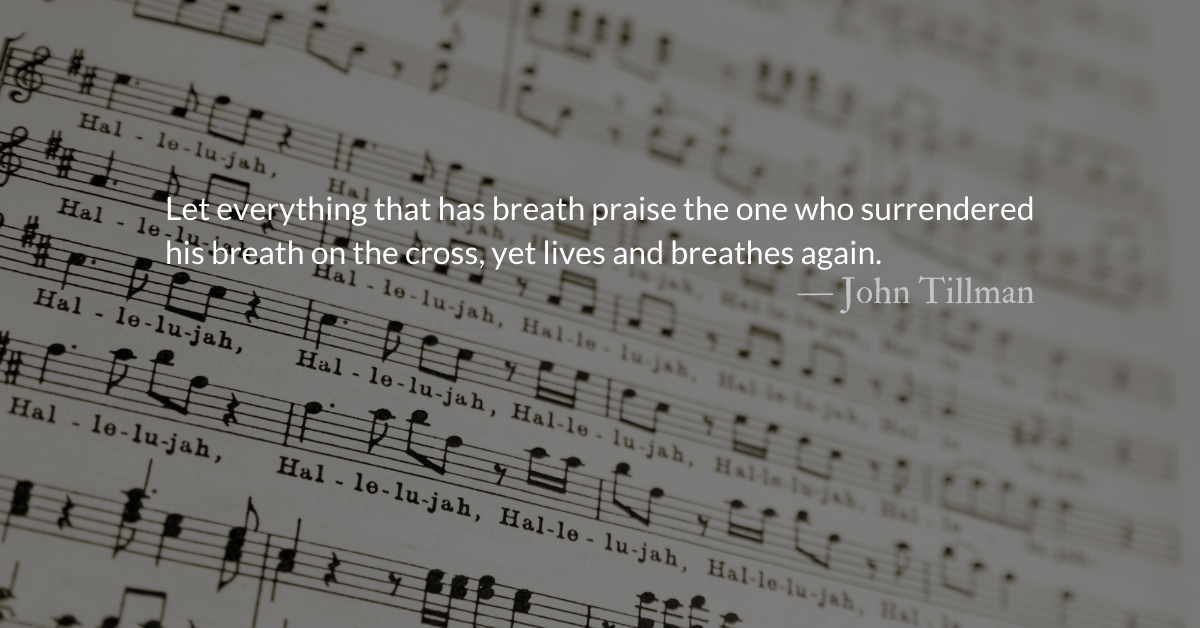Scripture Focus: Psalm 150.1-6
1 Praise the Lord.
Praise God in his sanctuary;
praise him in his mighty heavens.
2 Praise him for his acts of power;
praise him for his surpassing greatness.
3 Praise him with the sounding of the trumpet,
praise him with the harp and lyre,
4 praise him with timbrel and dancing,
praise him with the strings and pipe,
5 praise him with the clash of cymbals,
praise him with resounding cymbals.
6 Let everything that has breath praise the Lord.
Praise the Lord.
Reflection: All That Has Breath
By John Tillman
Jesus referred to the scripture as, “the law, the prophets, and the psalms” (Luke 24.44) and taught that all scripture was centered on him. Psalms contains many prophecies about Christ and it closes with praise that is due to him in a repetitive, poetic crescendo.
R.E.O. White (in the Evangelical Commentary) compares Psalm 150’s repetition to the “Hallelujah Chorus” from Messiah, by George Frideric Handel. It is an apt comparison. The chorus repeats, on one note, “King of Kings…and Lord of Lords.” Then answering voices call back energetically, “Hallelujah” and “forever and ever.” This repetition rises, note after note, chord after chord, higher and higher until it seems it can go no farther.
In Psalm 150, more and more instruments and individuals are commanded to join in praise. Imagine the building sound as you read…First trumpets of ram’s horn. Then plucked instruments such as lyres and harps. Next, drums and percussive instruments accompanied by dancers, perhaps stomping out the same rhythm. Next are more stringed instruments as well as flutes or pipes. Then, finally, clashing and resounding cymbals make their entrance.
“Hallelujah” concludes the second of three sections of Messiah. Charles Jennens, who wrote the libretto, titled the section “God’s Triumph.” Jennens specifically wrote Messiah to confront a rising trend of deism that denied Jesus’ divinity. The actual conclusion of Messiah is a section with text from Revelation, titled “Worthy is the Lamb that was Slain.”
Messiah is often performed at Christmas, but its message suits Easter better. It takes pains to present what Christ taught the Emmaus-bound disciples, “Did not the Messiah have to suffer these things and then enter his glory?” (Luke 24.26)
Let us celebrate Jesus’ triumph through his crucifixion and resurrection. Like the Emmaus disciples, Jesus is revealed to us in scripture. Are not our hearts burning within us? (Luke 24.32)
Let everything that has breath praise the one who surrendered his breath on the cross, yet lives and breathes again. May he breathe on us. (John 20.22) May his Holy Spirit lift us to our feet in praise to dance, sing, play, and serve our communities and our world.
Let there be praise.
In the sanctuary, in the heavens, let there be praise.
For his power, for his greatness, let there be praise.
With every instrument of word, deed, music, art, dancing, speech, writing, and labor, let there be praise.
Music: Handel’s ‘Hallelujah!’ Chorus live at the Sydney Opera House; Full performance of Messiah: Handel’s Messiah Live from the Sydney Opera House
Divine Hours Prayer: The Greeting
Remember your word to your servant, because you have given me hope.
This is my comfort in my trouble, that your promise gives me life. — Psalm 119.49-50
Today’s Readings
Joel 1Listen – 1:39)
Psalm 149-150(Listen -1:36)
Read more about Jesus Concealed and Revealed
Disciples don’t always seem to recognize the resurrected Jesus. Do we?
Read more about Unprecedented
In response to unprecedented times, Joel encourages…unprecedented prayer and repentance







